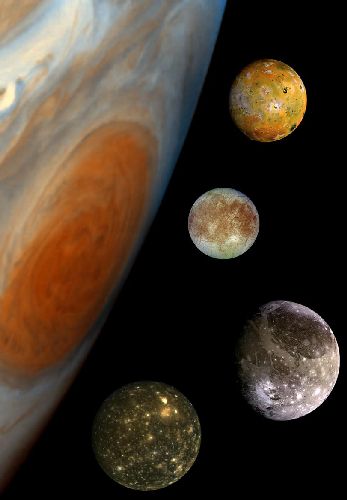Astronomy Picture of the Day
Discover the cosmos! Each day a different image or photograph of our fascinating universe is featured, along with a brief explanation written by a professional astronomer.

Credit: Galileo Project, Voyager Project, JPL, NASA |
Explanation: This composite image features classic portraits of members of one of the Solar System's most prominent families - Jupiter and its four large "Galilean" moons. Starting from the top the moons are Io, Europa, Ganymede, and Callisto. The top-to-bottom order is also the order of increasing distance from Jupiter. These are big moons indeed which attend the largest planet. The smallest of the lot, Europa, is the size of Earth's moon while Ganymede is the largest moon in the Solar System. In fact, Ganymede with a diameter of 3,100 miles, is larger than the planets Mercury and Pluto. The swirling Great Red Spot appears at the edge of Jupiter. A hurricane-like storm system that has persisted for over 300 years, two to three earths could fit inside it. Battered Callisto's image was recorded during the 1979 flyby of Voyager. The other portraits were taken by the Galileo spacecraft which began exploring the Jovian system in 1995.
|
Authors & editors:
Robert Nemiroff
(MTU) &
Jerry
Bonnell (USRA)
NASA Technical Rep.:
Jay Norris.
Specific rights apply.
A service of:
LHEA
at
NASA/
GSFC
&:
Michigan Tech. U.